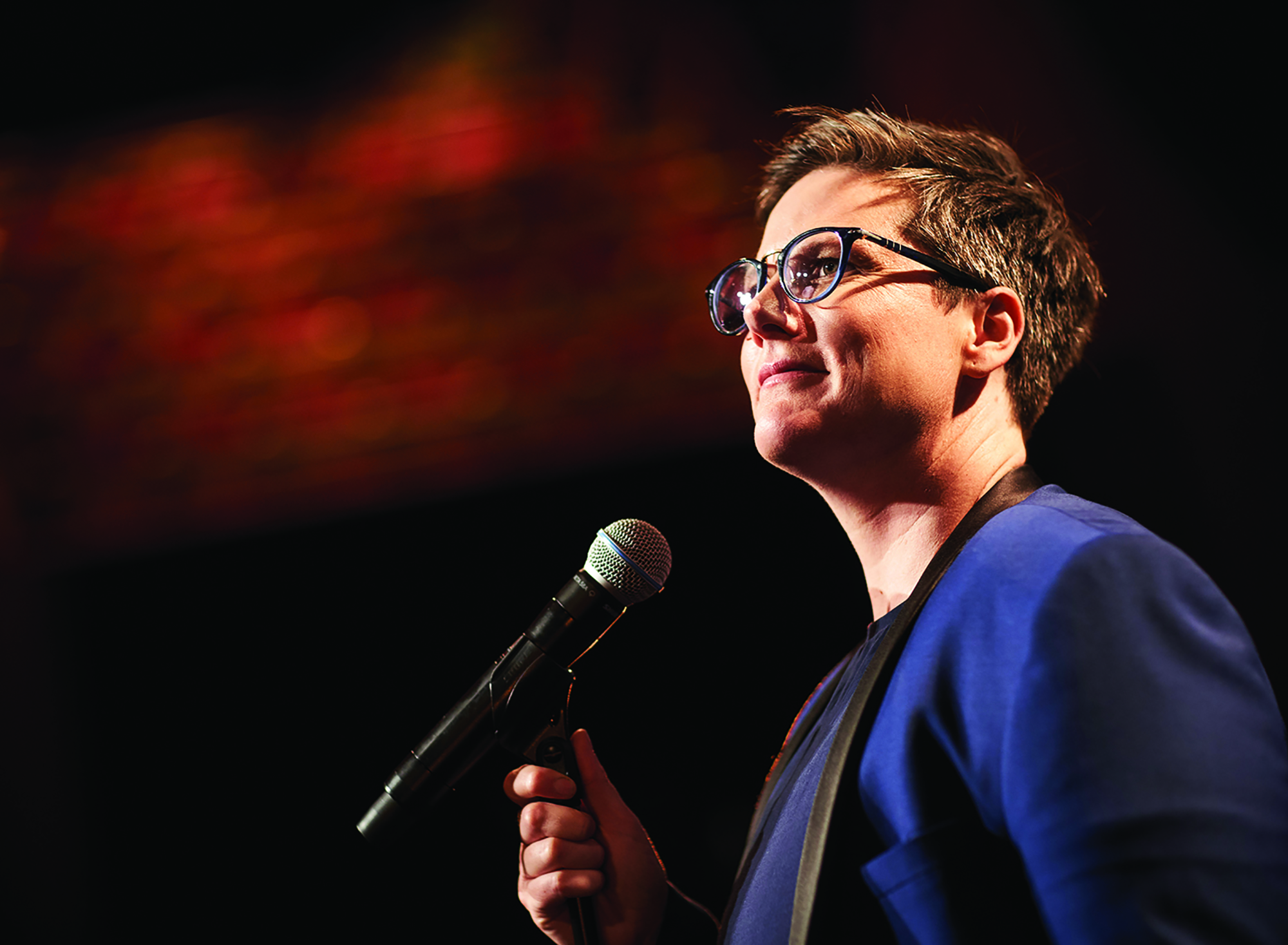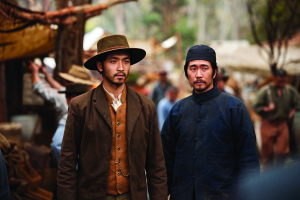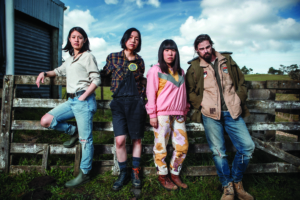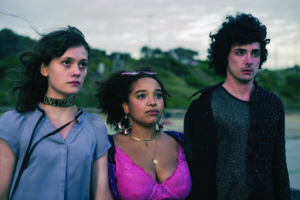I came out as trans to my grandma about a year before she died. My mother was against it, insisting it was unfair to ask someone of her advanced age to contend with such new, complex ideas. I gave my grandma more credit than that.
In a recent interview, Karamo Brown – one of the presenters of the recent Queer Eye reboot – reflects on how he doesn’t like using the term ‘coming out’, instead preferring ‘inviting someone in’: ‘For me, “coming out” gives the power to the other person to accept or deny you,’ he explains. ‘When you’re “inviting them in,” you have the power.’[1]Karamo Brown, quoted in Robbie Couch, ‘Queer Eye’s Karamo Brown Uses These 3 Words Instead of “Coming Out.” It Makes Sense.’, Upworthy, 25 April 2018, <https://www.upworthy.com/this-queer-eye-star-nailed-why-the-term-coming-out-may-need-a-makeover>, accessed 11 October 2018.
I wanted to invite my grandma into my life. I didn’t expect her to understand, but I wanted to give her the opportunity to try.
Her name was Nanette.
*
In Hannah Gadsby’s award-winning stand-up show Nanette – a filmed version of which premiered on Netflix in June last year – she talks at length about the impact that shame had on her as a young, queer child. That Pride is called ‘pride’ is no coincidence: shame is the LGBTQIA+ community’s bread and butter.
Humour is a survival mechanism for many marginalised groups. In high school, a Jewish friend used to tell the darkest Holocaust jokes. Whenever she would deliver the punchline, we would all fall quiet and she would howl with laughter. I asked her once what was with these jokes and she said, ‘You either laugh about it or you cry about it – and where’s the fun in crying?’
The pain in Gadsby’s childhood – particularly the repercussions of the 1996–1997 Tasmanian parliamentary votes on decriminalising homosexuality[2]See Rodney Croome, ‘Gay Law Reform’, The Companion to Tasmanian History, Centre for Tasmanian Historical Studies, University of Tasmania, 2006, <http://www.utas.edu.au/library/companion_to_tasmanian_history/G/Gay%20Law%20Reform.htm>, accessed 11 October 2018. – is familiar territory. Shame is the weapon of every bully – child, parent, administrator or politician – and willing teachers need guidance to combat it. When I saw her perform Nanette at the Melbourne International Comedy Festival, Gadsby spoke directly to the issues relating to Safe Schools. The way the country was talking about trans and other queer people through Safe Schools and the postal vote mimicked the way they spoke about gay people in Tasmania in the 1990s. This similarity was the beating heart of that performance.
So, given what she says isn’t new, it is surprising to me that Nanette has done so well in the mainstream.
It’s also unsurprising to me that Nanette has done so well in the mainstream.
*
I can’t tell you how hard I laughed when I heard Gadsby recount how her mother complained about her coming out: ‘Oh, Hannah, why did you tell me that? How would you feel if I said I was a murderer?’
In an attempt to prime my own mother for a conversation about my gender, I gave her a copy of Middlesex by Jeffrey Eugenides. Halfway through the book, Cal, the main character, comes to the realisation that he’s a man. Because of this, I thought it would be a good jumping-off point to start the gender conversation. Mum knew I was bisexual, but that conversation had gone badly so I wanted to lay some groundwork for this one.
I called her to ask how she liked the book. She loved it. Pleased with this response, I asked her what gender Cal was. ‘She’s a girl,’ was the reply, in classic my-mother fashion. I pressed her on this with, ‘Remember how he decides he’s a man?’
I could hear her squinting down the phone as she tried to recall the latter half of this 500-page book. She eventually conceded that she did remember, but this kicked off a diatribe about how the lesbians next door kept making everything about their sexuality, including how the bank didn’t recognise their partnership and so they couldn’t get a home loan. I gingerly suggested that perhaps what they were saying wasn’t so much about their sexuality as it was about the discrimination they were experiencing – that if anyone was ‘making it about their sexuality’, it was the banks. This input was brushed aside as my mother continued to lament how in-your-face gay people were, and how that seemed boorish considering the degree to which they complained about being targeted.
‘The thing is, if you wear a clown costume, people are going to talk,’ she concluded.
‘Mum … did you just liken being gay to wearing a clown costume?’
That day I laughed. Where’s the fun in crying?
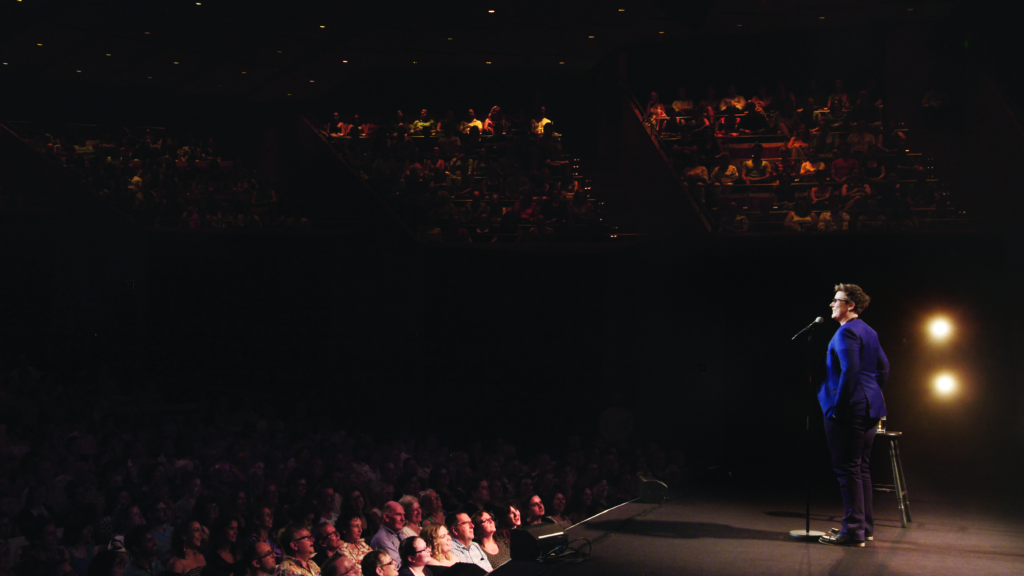
*
As my social-media circle consists predominantly of queer people like myself, the responses relating to Nanette that I have been exposed to are largely similar to my own. For us, watching Nanette is an exercise in catharsis. She speaks about the pain we all hold and, as she does so, the distance between her and us becomes paper-thin, then vanishes. She hurts, we hurt. She cuts, we bleed.
Hearing that Netflix had picked up Nanette was a powerful thing. It felt like queer history was being documented, like our pain was being seen and taken seriously. As the show’s popularity started to grow, however, that feeling turned like bad meat. Knowing the depths of pain that Nanette plumbs, the repeated advertisements for it – clip after clip of Gadsby’s face clogging up my feed – started to feel grotesque.
It was a forceful reminder that there are some deeply troubling implications to how straight people create and consume media that relate to LGBTQIA+ lives.
The media has trained us to enjoy the vicarious thrill that comes with the performance of trauma: it is familiar enough to evoke intense emotion, but distant enough to save us from actually feeling threatened. This is a problem when it comes to the depiction of queer trauma, as, in my experience, straight audiences have difficulty understanding how representations of queer trauma shape both the straight and the queer psyches.
Queer characters are met with a grisly demise so frequently in popular fiction that the phenomenon has been dubbed the ‘bury your gays’ trope.[3]See ‘Bury Your Gays’, TV Tropes, <https://tvtropes.org/pmwiki/pmwiki.php/Main/BuryYourGays>, accessed 11 October 2018. This trend is something that queer viewers are well acquainted with. It is a trade-off. In order to see ourselves represented, we must watch our own deaths play out in front of us. For the most part, it is a chilling experience, given that these narratives are mostly produced, written, directed and acted by cisgender straight people.
Creating a piece of fiction (and, to a lesser extent, nonfiction) is an exercise in playing god. Regardless of how much the diegetic world resembles reality, creators have complete control over everything that happens within their texts. The prevalence of ‘bury your gays’ shows how the mainstream has overwhelmingly decided to use this power to representationally murder queer people supposedly for the sake of storytelling.[4]See, for example, Kate Stanhope, ‘Bury Your Gays: TV Writers Tackle Trope, the Lexa Pledge and Offer Advice to Showrunners’, The Hollywood Reporter, 11 June 2016, <https://www.hollywoodreporter.com/live-feed/bury-your-gays-atx-festival-901800>, accessed 11 October 2018. At best, this demonstrates the subconscious belief that it is only natural and proper for queer people to suffer and die. At worst, it exemplifies that fiction is a space in which the straight psyche can play out its deepest desires without consequence or reprimand.
For queer audiences, this is frightening. It is frightening, too, to visit the comments sections of any article relating to LGBTQIA+ media. It’s one thing to see Neo-Nazi intimidation and threats of violence reminiscent of those hurled by Blair Cottrell at the queer Federation Square performer Dandyman.[5]Jesse Jones, ‘Melbourne Street Performer Abused with Homophobic Slurs’, Star Observer, 26 June 2018, <http://www.starobserver.com.au/news/national-news/victoria-news/street-performer-abused-homophobic-slurs/169893>, accessed 29 October 2018. It’s another to read self-described moderates uncritically defend their right to watch depictions of our pain and death for their entertainment. Many straight people don’t want to contend with what it means to enjoy watching us die in order to satisfy their emotional gratification. It makes them uncomfortable.
Gadsby has appeared on stage as a comedian for ten years. It is no coincidence that Nanette – a show driven by her own trauma – is the show that has captured the eye of the mainstream. For them, viewing this type of content is a form of ‘trauma tourism’ that they have been trained not to question: a brief excursion into pain followed by the relief that comes with knowing that it’s not a pain they will ever experience directly.
*
I have recently been exploring opportunities in theatre, but have been struggling with understanding what makes the form vital. When I ask my playwright friends what makes theatre important in the age of television, they invariably point to the fact that the audience is right there: to be in a room with a performer makes them a part of the performance. It is a communion, of sorts.
This answer has always felt unsatisfying to me, but the Netflix release of Gadsby’s show has helped me understand what they are getting at. In its in-person form, Nanette is the pure force of Gadsby owning her story. She claims her history and wields her trauma on the audience, deftly cutting viewers down to size – ripping all of us a university-debt-size arsehole, if you will. Speaking to The Guardian, Gadsby shares how nervous she was about the show: ‘I broke the contract and that’s what made this work,’ she says. ‘I betrayed people’s trust, and I did that really seriously, not just for effect.’[6]Hannah Gadsby, quoted in Jenny Valentish, ‘“I Broke the Contract”: How Hannah Gadsby’s Trauma Transformed Comedy’, The Guardian, 16 July 2018, <https://www.theguardian.com/stage/2018/jul/16/hannah-gadsby-trauma-comedy-nanette-standup-netflix>, accessed 11 October 2018. The audience comes to her show with the expectation of a laugh and, instead, gets the rug pulled out from under them. I remember the look on an acquaintance’s face after we saw the live performance together. I had given her two tickets and she had thanked me profusely. ‘It has been a hard week,’ she said. ‘We could really do with a laugh.’ After the show, I glimpsed her briefly in the crowd. We exchanged shell-shocked niceties and I resisted the urge to apologise.
Like the historical use of queer trauma for entertainment, the control the viewer has over the experience helps enable emotional tourism and undermines Gadsby’s attempt to hold privileged viewers accountable.
This experience demonstrates how the temporal nature of the show is crucial. In a live context, there is a cost to turning away. You can leave, but you miss out, sometimes on the rest of the performance. An audience is bound more tightly to the experience: it is a commitment and an act of faith. In television form, however, the act of turning away costs nothing. Gadsby’s story is now captured indefinitely; she and her trauma are available to anyone, at any time, in whatever way they want to engage with it. Like the historical use of queer trauma for entertainment, the control the viewer has over the experience helps enable emotional tourism and undermines Gadsby’s attempt to hold privileged viewers accountable. Instead of Gadsby commanding a room, her power is reduced. Straight audiences can ‘sneak away’ from her show without suffering the shame of a thousand eyes on them as they slink up the aisle.
There is something troubling, too, with monetising a show about someone claiming their trauma. Of course, Gadsby has profited from this performance – not just from the stage shows, but also from whatever financial and social capital Netflix has afforded her. However, in television form, her performance has become a commodity that Netflix is directly gaining revenue from. Her rage has been shot, edited and packaged into tantalising sound bites. Netflix has a stake in Gadsby’s trauma and it is happily leasing out a carbon copy of this performance to households all across the world.
Gadsby’s pain is now a product, suspended in time and easily downloadable. It makes me feel sick to think of the power this gives straight people. They, too, can now play god with her: to press pause, rewind and make her perform suffering for them whenever they like.
*
When I think of the name ‘Nanette’, I think of my grandma. In particular, I think of how her mother forced her, as a teenager, to wear pigtails in an attempt to ward off the interests of American GIs visiting New Zealand during World War II. That culture, steeped in Victorian values, was the culture that shaped her. Yet, decades later, she would write to me asking questions, trying to make sense of why I would cut off my hair and strap down my chest.
In the show, Gadsby says, ‘Artists don’t invent zeitgeists – they respond to it.’ Gadsby is not new, nor are her work, her experiences or the way she presents them. She is riding the crest of a zeitgeist that has been a long, long time coming.
In an interview with The Cut, American author Daniel Ortberg talked about what it was like to process the reaction of someone when you come out to them as trans. ‘I just feel like I’ve handed you a weapon,’ he says. ‘And even though you say “I love you, I promise I will never use this bow and arrow which has been specifically fashioned to find your heart,” you’re still holding it.’[7]Daniel Ortberg, quoted in Heather Havrilesky, ‘“Mallory Is Not Gone”: Daniel Mallory Ortberg on Coming Out as Trans’, The Cut, 13 March 2018, <https://www.thecut.com/2018/03/daniel-mallory-ortberg-interview-heather-havrilesky.html>, accessed 11 October 2018.
If it is anything, Nanette is a show that gives us a bow and arrow, and trains it directly on Gadsby’s heart – and on the hearts of every queer person. It has been heralded as a game changer,[8]See, for example, Jenna Scherer, ‘Nanette: Hannah Gadsby on Her Gamechanging Stand-up Special’, Rolling Stone, 9 July 2018, <https://www.rollingstone.com/tv/tv-features/nanette-hannah-gadsby-on-her-gamechanging-stand-up-special-696354/>, accessed 11 October 2018. and I hope that it is. It unpacks and subverts decades of stand-up formula, and it is a departure from the unspoken rule that only men can use anger in comedy. More than anything, I hope non-queer people respond to the call to arms that Nanette puts forward.
https://www.netflix.com/title/80233611
Endnotes
| 1 | Karamo Brown, quoted in Robbie Couch, ‘Queer Eye’s Karamo Brown Uses These 3 Words Instead of “Coming Out.” It Makes Sense.’, Upworthy, 25 April 2018, <https://www.upworthy.com/this-queer-eye-star-nailed-why-the-term-coming-out-may-need-a-makeover>, accessed 11 October 2018. |
|---|---|
| 2 | See Rodney Croome, ‘Gay Law Reform’, The Companion to Tasmanian History, Centre for Tasmanian Historical Studies, University of Tasmania, 2006, <http://www.utas.edu.au/library/companion_to_tasmanian_history/G/Gay%20Law%20Reform.htm>, accessed 11 October 2018. |
| 3 | See ‘Bury Your Gays’, TV Tropes, <https://tvtropes.org/pmwiki/pmwiki.php/Main/BuryYourGays>, accessed 11 October 2018. |
| 4 | See, for example, Kate Stanhope, ‘Bury Your Gays: TV Writers Tackle Trope, the Lexa Pledge and Offer Advice to Showrunners’, The Hollywood Reporter, 11 June 2016, <https://www.hollywoodreporter.com/live-feed/bury-your-gays-atx-festival-901800>, accessed 11 October 2018. |
| 5 | Jesse Jones, ‘Melbourne Street Performer Abused with Homophobic Slurs’, Star Observer, 26 June 2018, <http://www.starobserver.com.au/news/national-news/victoria-news/street-performer-abused-homophobic-slurs/169893>, accessed 29 October 2018. |
| 6 | Hannah Gadsby, quoted in Jenny Valentish, ‘“I Broke the Contract”: How Hannah Gadsby’s Trauma Transformed Comedy’, The Guardian, 16 July 2018, <https://www.theguardian.com/stage/2018/jul/16/hannah-gadsby-trauma-comedy-nanette-standup-netflix>, accessed 11 October 2018. |
| 7 | Daniel Ortberg, quoted in Heather Havrilesky, ‘“Mallory Is Not Gone”: Daniel Mallory Ortberg on Coming Out as Trans’, The Cut, 13 March 2018, <https://www.thecut.com/2018/03/daniel-mallory-ortberg-interview-heather-havrilesky.html>, accessed 11 October 2018. |
| 8 | See, for example, Jenna Scherer, ‘Nanette: Hannah Gadsby on Her Gamechanging Stand-up Special’, Rolling Stone, 9 July 2018, <https://www.rollingstone.com/tv/tv-features/nanette-hannah-gadsby-on-her-gamechanging-stand-up-special-696354/>, accessed 11 October 2018. |
